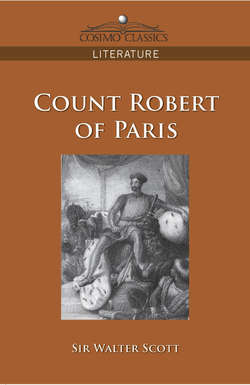Читать книгу Count Robert of Paris - Вальтер Скотт - Страница 5
Chapter II
Notes to Chapter II
ОглавлениеNote I., – Constantinople
The impression which the imperial city was calculated to make on such visitors as the Crusaders of the West, is given by the ancient French chronicler Villehardouin, who was present at the capture of A. D. 1203. "When we had come," he says, "within three leagues, to a certain Abbey, then we could plainly survey Constantinople. There the ships and the galleys came to anchor; and much did they who had never been in that quarter hefore, gaze upon the city. That such a city could be in the world they had never conceived, and they were never weary of staring at the high walls and towers with which it was entirely encompassed, the rich palaces and lofty churches, of which there were so many that no one could have believed it, if he had not seen with his own eyes that city, the Queen of all cities. And know that there was not so bold a heart there, that it did not feel some terror at the strength of Constantinople." – Chap. 66.
Again, – "And now many of those of the host went to see Constantinople within, and the rich palaces and stately churches of which it possesses so many, and the riches of the place, which are such as no other city ever equalled. I need not speak of the sanctuaries, which are as many as are in all the world beside." – Chap. 100.
Note II., – Varangians
Villehardouin, in describing the siege of Constantinople, A. D. 1203, says, "Li murs fu mult garnis d'Anglois et de Danois," – hence the dissertation of Ducange here quoted, and several articles besides in his Glossarium, as Varangi, Warengangi, &c. The etymology of the name is left uncertain, though the German fort-ganger, i. e. forth-goer, wanderer, exile, seems the most probable. The term occurs in various Italian and Sicilian documents, anterior to the establishment of the Varangian Guards at Constantinople, and collected by Muratori; as, for instance, in an edict of one of the Lombard kings, "Omnes Warengangi, qui de exteris finibus in regni nostri finibus advenerint, seque sub scuto potestatis nostras subdiderint, legibus nostris Longobardorum vivere debeant," – and in another, "De Warengangis, nobilibus, mediocribus, et rusticis hominibus, qui usque nunc in terra vestra fugiti sunt, habeatis eos." – Muratori, vol. ii. p. 261.
With regard to the origin of the Varangian Guard, the most distinct testimony is that of Ordericus Vitalis, who says, "When therefore the English had lost their liberty, they turned themselves with zeal to discover the means of throwing off the unaccustomed yoke. Some fled to Sueno, King of the Danes, to excite him to the recovery of the inheritance of his grandfather, Canute. Not a few fled into exile in other regions, either from the mere desire of escaping from under the Norman rule, or in the hope of acquiring wealth, and so being one day in a condition to renew the struggle at home. Some of these, In the bloom of youth, penetrated into a far distant land, and offered themselves to the military service of the Constantinopolitan Emperor – that wise prince, against whom Robert Guiscard, Duke of Apulia, had then raised all his forces. The English exiles were favourably received, and opposed in battle to the Normans, for whose encounter the Greeks themselves were too weak. Alexius began to build a town for the English, a little above Constantinople, at a place called Chevelot, but the trouble of the Normans from Sicily still increasing, he soon recalled them to the capital, and intrusted the principal palace with all its treasures to their keeping. This was the method in which the Saxon English found their way to Ionia, where they still remain, highly valued by the Emperor and the people." – Book IV. p. 508.
